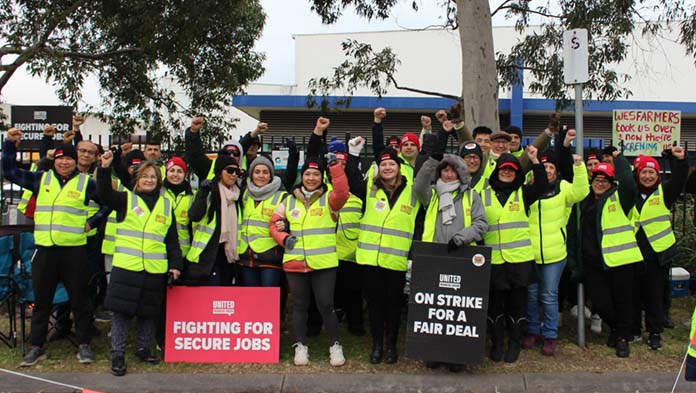Workers at a pharmaceutical warehouse in Melbourne that employs 190 people have been on strike for three weeks fighting for pay rises to match inflation and equal rates for casual workers.
The warehouse in Dandenong, run by Australian Pharmaceutical Industries (API), distributes stock to Priceline pharmacies and is now owned by the giant Wesfarmers conglomerate, which reported a staggering $2.35 billion profit in the 2022 financial year.
Its CEO earns more in just four days than an API worker makes in an entire year.
Workers voted down a non-union agreement on Thursday this week when management tried to force through their offer.
“We’re fighting for a fair pay increase to keep up with the cost of living. All we’re asking for is an extra $2.25 an hour,” United Workers Union (UWU) delegate Alicia told a union family day at the picket line on Saturday 8 July.
API has offered 5 per cent this year as part of a four-year agreement, followed by 4, 3.5 and 3 per cent over the rest of the agreement for an average annual pay increase of 3.8 per cent. The UWU is demanding 7 per cent this year.
“There is no pride in paying your workers less than what they deserve”, declared Alicia to booming applause.
“We want fair redundancies for all and we want same job same pay for everyone that works here.” This would mean that casual employees who are currently being paid less receive the same rate as permanent employees.
“We are completely sick of being pushed around and taken advantage of by greedy corporations. We are strong and we are united and we are going to stay out here until we win.”
API’s lack of commitment to its workers during this cost-of-living crisis is in stark contrast to the commitment that the company demanded from the workers during the COVID pandemic, when they were asked to work long hours for the company.
Another worker, Anna, told the crowd that the company was showing “just blatant disrespect. We’re not asking for something ridiculous, we’re asking to be able to feed our families.”
The workers are also seeking increased redundancy payments.
The company also wants to base pay on meeting key performance indicators (KPIs). Workers fear this could lead to unfair treatment and jeopardise their job security.
Management have already targeted workers involved in the strike, hauling workers into mandatory management meetings after they briefly returned to work following the start of the strike.
Defying the law
The company is working to undermine the strike by continuing to run the warehouse using casual workers. API even flew in workers from Sydney to help keep the site operating.
But the union has also avoided organising hard pickets to stop scab labour and trucks getting in and out of the Melbourne warehouse. This is the kind of action needed to cripple the company’s operations and force them to the table.
API have also started to redirect shipments coming to the Melbourne warehouse to their warehouse in Sydney.
This shows the need for solidarity action from API workers in Sydney to refuse to do work redirected from Melbourne.
To win a pay rise that keeps up with the cost of living, and all their demands, API workers need to defy the Fair Work Commission and the anti-union laws, organising mass pickets along with solidarity from other workers.
You can show your support by visiting the picket line at 35-61 South Park Dr, Dandenong South or by donating here






